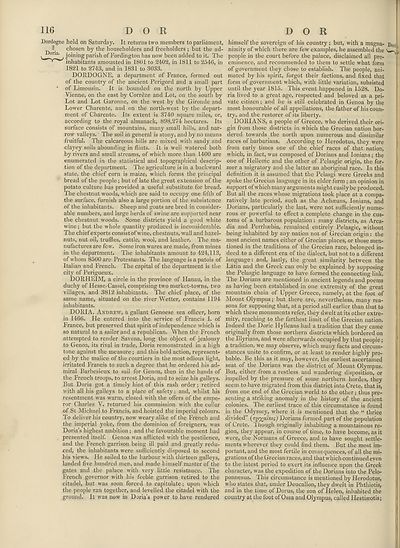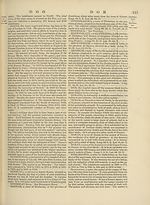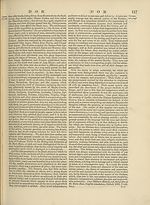Encyclopaedia Britannica > Volume 8, DIA-England
(126) Page 116 - DOR
Download files
Complete book:
Individual page:
Thumbnail gallery: Grid view | List view

116 DOR
Dordogne held on Saturday. It returns two members to parliament,
ll. chosen by the householders and freeholders; but the ad-
, °™' J joining parish of Fordington has now been added to it. The
inhabitants amounted in 1801 to 2402, in 1811 to 2546, in
1821 to 2743, and in 1831 to 3033.
DORDOGNE, a department of France, formed out
of the country of the ancient Perigord and a small part
* of Limousin. It is bounded on the north by Upper
Vienne, on the east by Correze and Lot, on the south by
Lot and Lot Garonne, on the west by the Gironde and
Lower Charente, and on the north-west by the depart¬
ment of Charente. Its extent is 3740 square miles, or,
according to the royal almanack, 898,274 hectares. Its
surface consists of mountains, many small hills, and nar¬
row valleys. The soil in general is stony, and by no means
fruitful. The calcareous hills are mixed with sandy and
clayey soils abounding in flints. It is well watered both
by rivers and small streams, of which more than 1400 are
enumerated in the statistical and topographical descrip¬
tion of the department. The agriculture is in a backward
state, the chief corn is maize, which forms the principal
bread of the people; but of late the great extension of the
potato culture has provided a useful substitute for bread.
The chestnut woods, which are said to occupy one fifth of
the surface, furnish also a large portion of the subsistence
of the inhabitants. Sheep and goats are bred in consider¬
able numbers, and large herds of swine are supported near
the chestnut woods. Some districts yield a good white
wine; but the whole quantity produced is inconsiderable.
The chief exports consistof wdne, chestnuts, wall and hazel¬
nuts, nut oil, truffles, cattle, wool, and leather. The ma¬
nufactures are few. Some iron wares are made, from mines
in the department. The inhabitants amount to 424,113,
of whom 8500 are Protestants. The language is a patois of
Italian and French. The capital of the department is the
city of Perigueux.
DORHEIM, a circle in the province of Hanau, in the
duchy of Hesse-Cassel, comprising two market-towns, two
villages, and 3812 inhabitants. The chief place, of the
same name, situated on the river Wetter, contains 1194
inhabitants.
DORIA, Andrew, a gallant Genoese sea officer, born
in 1466. He entered into the service of Francis I. of
France, but preserved that spirit of independence which is
so natural to a sailor and a republican. When the French
attempted to render Savona, long the object of jealousy
to Genoa, its rival in trade, Doria remonstrated in a high
tone against the measure; and this bold action, represent¬
ed by the malice of the courtiers in the most odious light,
irritated Francis to such a degree that he ordered his ad¬
miral Barbesieux to sail for Genoa, then in the hands of
the French troops, to arrest Doria, and to seize his galleys.
But Doria got a timely hint of this rash order; retired
with all his galleys to a place of safety; and, whilst his
resentment was warm, closed with the offers of the empe¬
ror Charles V. returned his commission with the collar
of St Michael to Francis, and hoisted the imperial colours.
To deliver his country, now weary alike of the French and
the imperial yoke, from the dominion of foreigners, was
Doria’s highest ambition ; and the favourable moment had
presented itself. Genoa was afflicted with the pestilence,
and the French garrison being ill paid and greatly redu¬
ced, the inhabitants were sufficiently disposed to second
his views. He sailed to the harbour with thirteen galleys,
landed five hundred men, and made himself master of the
gates and the palace with very little resistance. The
French governor with his feeble garrison retired to the
citadel, but was soon forced to capitulate; upon which
the people ran together, and levelled the citadel with the
ground. It was now in Doria’s power to have rendered
DOR
himself the sovereign of his country ; but, with a magna- Dori
nimity of which there are few examples, he assembled the /
people in the court before the palace, disclaimed all pre- !
eminence, and recommended to them to settle what form
of government they chose to establish. The people, ani¬
mated by his spirit, forgot their factions, and fixed that
form of government which, with little variation, subsisted
until the year 1815. This event happened in 1528. Do¬
ria lived to a great age, respected and beloved as a pri¬
vate citizen; and he is still celebrated in Genoa by the
most honourable of all appellations, the father of his coun¬
try, and the restorer of its liberty.
DORIANS, a people of Greece, who derived their ori¬
gin from those districts in which the Grecian nation bor¬
dered towards the north upon numerous and dissimilar
races of barbarians. According to Herodotus, they were
from early times one of the chief races of that nation,
which, in fact, was composed of Dorians and lonians; the
one of Hellenic and the other of Pelasgic origin, the for¬
mer a migratory and the latter an aboriginal race. In this
definition it is assumed that the Pelasgi were Greeks and
spoke the Grecian language in its elder form ; an opinion in
support of which many arguments might easily be produced.
But all the races whose migrations took place at a compa¬
ratively late period, such as the Achaeans, lonians, and
Dorians, particularly the last, were not sufficiently nume¬
rous or powerful to effect a complete change in the cus¬
toms of a barbarous population: many districts, as Arca¬
dia and Perrhaebia, remained entirely Pelasgic, without
being inhabited by any nation not of Grecian origin: the
most ancient names either of Grecian places, or those men¬
tioned in the traditions of the Grecian race, belonged in¬
deed to a different era of the dialect, but not to a difierent
language: and, lastly, the great similarity between the
Latin and the Greek can only be explained by supposing
the Pelasgic language to have formed the connecting link.
The Dorians are mentioned in ancient legends and poems
as having been established in one extremity of the great
mountain chain of Upper Greece, namely, at the foot of
Mount Olympus; but there are, nevertheless, many rea¬
sons for supposing that, at a period still earlier than that to
which these monuments refer, they dwelt at its other extre¬
mity, reaching to the farthest limit of the Grecian nation.
Indeed the Doric Hylleans had a tradition that they came
originally from those northern districts which bordered on
the Illyrians, and were afterwards occupied by that people;
a tradition, we may observe, which many facts and circum¬
stances unite to confirm, or at least to render highly pro¬
bable. Be this as it may, however, the earliest ascertained
seat of the Dorians was the district of Mount Olympus.
But, either from a restless and wandering disposition, or
impelled by the pressure of some northern hordes, they
seem to have migrated from this district into Crete, that is,
from one end of the Grecian world to the other; thus pre¬
senting a striking anomaly in the history of the ancient
colonies. The earliest trace of this circumstance is found
in the Odyssey, where it is mentioned that the “ thrice
divided” (rg/^a/xss) Dorians formed part of the population
of Crete. Though originally inhabiting a mountainous re¬
gion, they appear, in course of time, to have become, as it
were, the Normans of Greece, and to have sought settle¬
ments wherever they could find them. But the most im¬
portant, and the most fertile in consequences, of all the mi¬
grations of the Grecian races, and that which continued even
to the latest period to exert its influence upon the Greek
character, was the expedition of the Dorians into the Pelo¬
ponnesus. This circumstance is mentioned by Herodotus,
who states that, under Deucalion, they dwelt in Phthiotis,
and in the time of Dorus, the son of Helen, inhabited the
country at the foot of Ossa and Olympus, called Hestiaeotis;
Dordogne held on Saturday. It returns two members to parliament,
ll. chosen by the householders and freeholders; but the ad-
, °™' J joining parish of Fordington has now been added to it. The
inhabitants amounted in 1801 to 2402, in 1811 to 2546, in
1821 to 2743, and in 1831 to 3033.
DORDOGNE, a department of France, formed out
of the country of the ancient Perigord and a small part
* of Limousin. It is bounded on the north by Upper
Vienne, on the east by Correze and Lot, on the south by
Lot and Lot Garonne, on the west by the Gironde and
Lower Charente, and on the north-west by the depart¬
ment of Charente. Its extent is 3740 square miles, or,
according to the royal almanack, 898,274 hectares. Its
surface consists of mountains, many small hills, and nar¬
row valleys. The soil in general is stony, and by no means
fruitful. The calcareous hills are mixed with sandy and
clayey soils abounding in flints. It is well watered both
by rivers and small streams, of which more than 1400 are
enumerated in the statistical and topographical descrip¬
tion of the department. The agriculture is in a backward
state, the chief corn is maize, which forms the principal
bread of the people; but of late the great extension of the
potato culture has provided a useful substitute for bread.
The chestnut woods, which are said to occupy one fifth of
the surface, furnish also a large portion of the subsistence
of the inhabitants. Sheep and goats are bred in consider¬
able numbers, and large herds of swine are supported near
the chestnut woods. Some districts yield a good white
wine; but the whole quantity produced is inconsiderable.
The chief exports consistof wdne, chestnuts, wall and hazel¬
nuts, nut oil, truffles, cattle, wool, and leather. The ma¬
nufactures are few. Some iron wares are made, from mines
in the department. The inhabitants amount to 424,113,
of whom 8500 are Protestants. The language is a patois of
Italian and French. The capital of the department is the
city of Perigueux.
DORHEIM, a circle in the province of Hanau, in the
duchy of Hesse-Cassel, comprising two market-towns, two
villages, and 3812 inhabitants. The chief place, of the
same name, situated on the river Wetter, contains 1194
inhabitants.
DORIA, Andrew, a gallant Genoese sea officer, born
in 1466. He entered into the service of Francis I. of
France, but preserved that spirit of independence which is
so natural to a sailor and a republican. When the French
attempted to render Savona, long the object of jealousy
to Genoa, its rival in trade, Doria remonstrated in a high
tone against the measure; and this bold action, represent¬
ed by the malice of the courtiers in the most odious light,
irritated Francis to such a degree that he ordered his ad¬
miral Barbesieux to sail for Genoa, then in the hands of
the French troops, to arrest Doria, and to seize his galleys.
But Doria got a timely hint of this rash order; retired
with all his galleys to a place of safety; and, whilst his
resentment was warm, closed with the offers of the empe¬
ror Charles V. returned his commission with the collar
of St Michael to Francis, and hoisted the imperial colours.
To deliver his country, now weary alike of the French and
the imperial yoke, from the dominion of foreigners, was
Doria’s highest ambition ; and the favourable moment had
presented itself. Genoa was afflicted with the pestilence,
and the French garrison being ill paid and greatly redu¬
ced, the inhabitants were sufficiently disposed to second
his views. He sailed to the harbour with thirteen galleys,
landed five hundred men, and made himself master of the
gates and the palace with very little resistance. The
French governor with his feeble garrison retired to the
citadel, but was soon forced to capitulate; upon which
the people ran together, and levelled the citadel with the
ground. It was now in Doria’s power to have rendered
DOR
himself the sovereign of his country ; but, with a magna- Dori
nimity of which there are few examples, he assembled the /
people in the court before the palace, disclaimed all pre- !
eminence, and recommended to them to settle what form
of government they chose to establish. The people, ani¬
mated by his spirit, forgot their factions, and fixed that
form of government which, with little variation, subsisted
until the year 1815. This event happened in 1528. Do¬
ria lived to a great age, respected and beloved as a pri¬
vate citizen; and he is still celebrated in Genoa by the
most honourable of all appellations, the father of his coun¬
try, and the restorer of its liberty.
DORIANS, a people of Greece, who derived their ori¬
gin from those districts in which the Grecian nation bor¬
dered towards the north upon numerous and dissimilar
races of barbarians. According to Herodotus, they were
from early times one of the chief races of that nation,
which, in fact, was composed of Dorians and lonians; the
one of Hellenic and the other of Pelasgic origin, the for¬
mer a migratory and the latter an aboriginal race. In this
definition it is assumed that the Pelasgi were Greeks and
spoke the Grecian language in its elder form ; an opinion in
support of which many arguments might easily be produced.
But all the races whose migrations took place at a compa¬
ratively late period, such as the Achaeans, lonians, and
Dorians, particularly the last, were not sufficiently nume¬
rous or powerful to effect a complete change in the cus¬
toms of a barbarous population: many districts, as Arca¬
dia and Perrhaebia, remained entirely Pelasgic, without
being inhabited by any nation not of Grecian origin: the
most ancient names either of Grecian places, or those men¬
tioned in the traditions of the Grecian race, belonged in¬
deed to a different era of the dialect, but not to a difierent
language: and, lastly, the great similarity between the
Latin and the Greek can only be explained by supposing
the Pelasgic language to have formed the connecting link.
The Dorians are mentioned in ancient legends and poems
as having been established in one extremity of the great
mountain chain of Upper Greece, namely, at the foot of
Mount Olympus; but there are, nevertheless, many rea¬
sons for supposing that, at a period still earlier than that to
which these monuments refer, they dwelt at its other extre¬
mity, reaching to the farthest limit of the Grecian nation.
Indeed the Doric Hylleans had a tradition that they came
originally from those northern districts which bordered on
the Illyrians, and were afterwards occupied by that people;
a tradition, we may observe, which many facts and circum¬
stances unite to confirm, or at least to render highly pro¬
bable. Be this as it may, however, the earliest ascertained
seat of the Dorians was the district of Mount Olympus.
But, either from a restless and wandering disposition, or
impelled by the pressure of some northern hordes, they
seem to have migrated from this district into Crete, that is,
from one end of the Grecian world to the other; thus pre¬
senting a striking anomaly in the history of the ancient
colonies. The earliest trace of this circumstance is found
in the Odyssey, where it is mentioned that the “ thrice
divided” (rg/^a/xss) Dorians formed part of the population
of Crete. Though originally inhabiting a mountainous re¬
gion, they appear, in course of time, to have become, as it
were, the Normans of Greece, and to have sought settle¬
ments wherever they could find them. But the most im¬
portant, and the most fertile in consequences, of all the mi¬
grations of the Grecian races, and that which continued even
to the latest period to exert its influence upon the Greek
character, was the expedition of the Dorians into the Pelo¬
ponnesus. This circumstance is mentioned by Herodotus,
who states that, under Deucalion, they dwelt in Phthiotis,
and in the time of Dorus, the son of Helen, inhabited the
country at the foot of Ossa and Olympus, called Hestiaeotis;
Set display mode to:
![]() Universal Viewer |
Universal Viewer | ![]() Mirador |
Large image | Transcription
Mirador |
Large image | Transcription
Images and transcriptions on this page, including medium image downloads, may be used under the Creative Commons Attribution 4.0 International Licence unless otherwise stated. ![]()
| Encyclopaedia Britannica > Encyclopaedia Britannica > Volume 8, DIA-England > (126) Page 116 - DOR |
|---|
| Permanent URL | https://digital.nls.uk/193324643 |
|---|
| Attribution and copyright: |
|
|---|
| Description | Ten editions of 'Encyclopaedia Britannica', issued from 1768-1903, in 231 volumes. Originally issued in 100 weekly parts (3 volumes) between 1768 and 1771 by publishers: Colin Macfarquhar and Andrew Bell (Edinburgh); editor: William Smellie: engraver: Andrew Bell. Expanded editions in the 19th century featured more volumes and contributions from leading experts in their fields. Managed and published in Edinburgh up to the 9th edition (25 volumes, from 1875-1889); the 10th edition (1902-1903) re-issued the 9th edition, with 11 supplementary volumes. |
|---|---|
| Additional NLS resources: |
|

